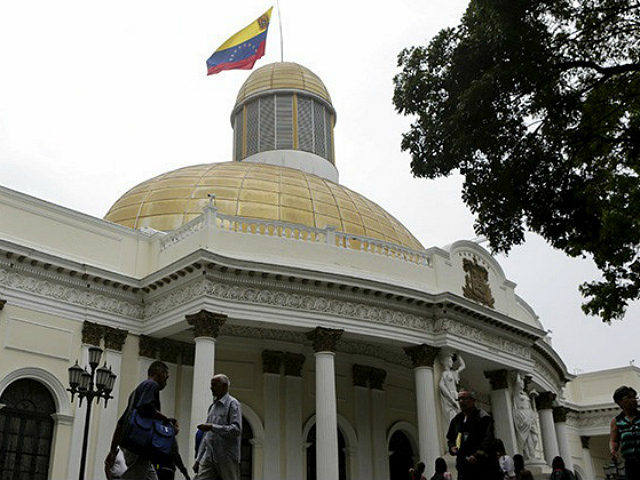Venezuela’s National Assembly will begin proceedings Tuesday to remove all justices of the nation’s Supreme Court, following that body’s ruling last week attempting to usurp legislative authority away from the opposition-controlled parliament to itself.
The legislators representing the opposition Democratic Unity Roundtable (MUD) coalition, which seeks to end the rule of socialist dictator Nicolás Maduro, have stated that the attempt to nullify the National Assembly and replace it with the Supreme Court was an unpardonable violation of the constitutional order that requires the resignation of all those on the bench.
Article 265 of the 1999 Venezuelan constitution allows for such a measure. “The magistrates of the TSJ [Supreme Tribunal of Justice] can be removed by the National Assembly via majority vote of two-thirds of its members, given a prior audience to the interested parties, in the case of grave faults qualified by the people’s power,” the article reads.
On Monday, MUD representatives held a press conference in which they accused the Supreme Court of acting to benefit Maduro, who has repeatedly called for the dissolution of the National Assembly since the opposition won the majority in the national parliamentary elections in 2015.
“Nicolás Maduro is attempting to impose a false version of events and claim that this is about an impasse between the Attorney General’s Office and the TSJ,” lawmaker Juan Miguel Matheus told reporters. “We are duty-bound to speak with the truth and denounce this rupture of the constitutional order.”
Last week, the Supreme Court issued a ruling accusing the National Assembly of being in “contempt” of the court by not expelling three opposition lawmakers Maduro’s officials claim committed fraud in their regional elections. Due to this status of “contempt,” the ruling held that the National Assembly no longer held legislative authority, that the Supreme Court was now the lawmaking body of Venezuela, and that legislators no longer held official immunity, leaving them vulnerable to becoming prisoners of conscience.
By Saturday, following nationwide protests and outrage from the international human rights community, the Supreme Court had issued two more directives: Rulings 158 and 159, which return lawmaking authority to the Congress and reaffirm legislative immunity, respectively.
“Nothing has changed, the coup continues,” Julio Borges, the president of the National Assembly, said in response to the new rulings. Borges declared the original ruling “garbage” and tore apart a copy of it on the steps of the Supreme Court last Wednesday.
Borges’ colleagues led a protest in front of the Supreme Court on Monday to reaffirm their commitment to remove the justices responsible for the unconstitutional order. “This is complete bullshit, they are coup plotters” one lawmaker protesting told reporters, using Venezuelan vernacular.
In an official statement, the MUD expressed its opposition in more formal terms. “Venezuela is not experiencing an impasse between diverging organs of the regime, but an abyss between the national government, on one side, and popular sovereignty and the Constitution, on the other,” a statement signed by Borges and other MUD lawmakers published Tuesday read.
Maduro has largely refrained from commenting on the incident save to mock Borges. “Borges is hysterical,” he said on his weekly television program Sunday, referring to the chief legislator using feminine adjective conjugations. “She needs a psychiatrist.” “You’ll be president on a cold day in Hell,” he taunted.
In addition to the presidential taunting, the United Socialist Party of Venezuela (PSUV) has organized a march against the legislature for Tuesday. Spearheaded by PSUV vice president Adán Chávez, brother of the late dictator Hugo Chávez, the march intends to oppose the constitutional process to remove the Supreme Court justices, which Chávez referred to as a “coup.”
The relationship between the opposition legislature and Maduro’s Supreme Court merits the lack of confidence Borges is exhibiting, however. For one, the Supreme Court ruled in January 2016 that any laws passed by the opposition were automatically rendered void, which leaves unanswered the issue of whether deposing the Supreme Court’s judges is an enforceable, if not unconstitutional, procedure.
The outlet Caraota Digital notes that the Supreme Court has passed 58 rulings since the opposition took over the legislature in December 2015 limiting legislative power.
“The effort of the national government to make irrelevant all actions produced by the legislative branch have turned it into the object of aggression since the moment it was elected,” Mercedes De Freitas, the head of the NGO Transparencia Venezuela, said in a statement.

COMMENTS
Please let us know if you're having issues with commenting.